Ecosyste.ms: Awesome
An open API service indexing awesome lists of open source software.
https://github.com/stla/polygonsoup
Make a consistent mesh from a polygon soup.
https://github.com/stla/polygonsoup
cgal mesh r rcpp
Last synced: about 2 months ago
JSON representation
Make a consistent mesh from a polygon soup.
- Host: GitHub
- URL: https://github.com/stla/polygonsoup
- Owner: stla
- Created: 2022-10-15T12:37:11.000Z (about 2 years ago)
- Default Branch: main
- Last Pushed: 2022-11-04T10:44:21.000Z (about 2 years ago)
- Last Synced: 2024-10-15T21:41:00.344Z (2 months ago)
- Topics: cgal, mesh, r, rcpp
- Language: R
- Homepage:
- Size: 1.32 MB
- Stars: 5
- Watchers: 2
- Forks: 1
- Open Issues: 2
-
Metadata Files:
- Readme: README.md
Awesome Lists containing this project
README
# PolygonSoup
Make a consistent mesh from a polygon soup.
[](https://github.com/stla/PolygonSoup/actions/workflows/R-CMD-check.yaml)
A polygon soup is a set of unorganized polygons. For example, define a
tetrahedron as follows:
```r
vertices <- rbind(
c(-1, -1, -1),
c( 1, 1, -1),
c( 1, -1, 1),
c(-1, 1, 1)
)
faces <- rbind(
c(1, 2, 3),
c(3, 4, 2),
c(4, 2, 1),
c(4, 3, 1)
)
```
Now plot it by painting the front of its faces in blue and the back of its
faces in red; then both colors appear:
```r
library(rgl)
tmesh <- tmesh3d(
vertices = t(vertices),
indices = t(faces),
homogeneous = FALSE
)
shade3d(tmesh, color = "blue", back = "cull")
shade3d(tmesh, color = "red", front = "cull")
```
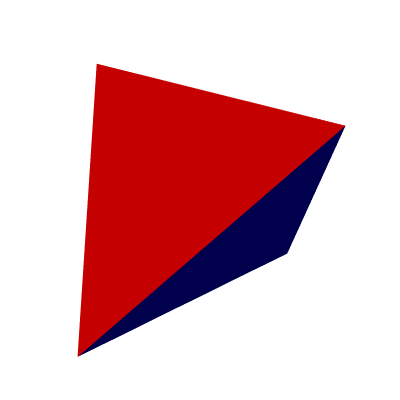
To get a mesh with coherently oriented faces, use the `Mesh` function:
```r
library(PolygonSoup)
mesh <- Mesh(vertices, faces, normals = FALSE)
tmesh <- toRGL(mesh)
shade3d(tmesh, color = "blue", back = "cull")
```
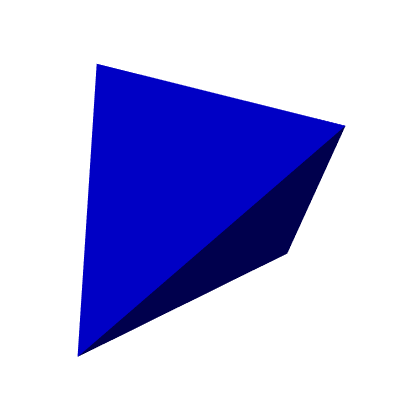
The **PolygonSoup** package can deal with polygon soups whose polygons have
any number of sides. For example, consider a pentagrammic prism:
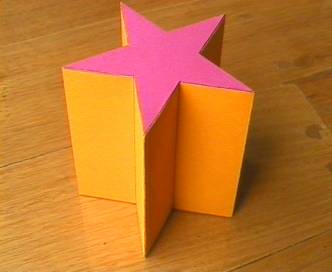
The vertices and the faces of a pentagrammic prism are given in the package,
in a list named `PentagrammicPrism`. Two faces, at the center of the two
pentagramms, are pentagonal. Therefore one cannot directly plot the prism with
**rgl**. The `Mesh` function allows to triangulate the faces:
```r
mesh <- Mesh(
mesh = pentagrammicPrism,
triangulate = TRUE, normals = FALSE
)
```
Now we can plot the pentagrammic prism. We can also plot its edges with the
help of the `plotEdges` function:
```r
tmesh <- toRGL(mesh)
shade3d(tmesh, color = "maroon")
plotEdges(
mesh[["vertices"]], mesh[["edges"]], color = "darkred",
tubesRadius = 0.02, spheresRadius = 0.02
)
```
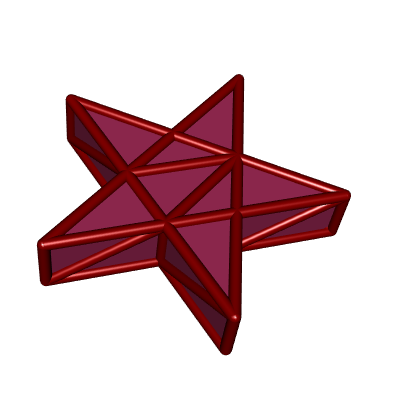
The triangulation introduces additional edges, and you probably don't want to
see them. In `mesh[["edges0"]]`, one has the edges before the triangulation:
```r
shade3d(tmesh, color = "maroon")
plotEdges(
mesh[["vertices"]], mesh[["edges0"]], color = "darkred",
tubesRadius = 0.02, spheresRadius = 0.02
)
```
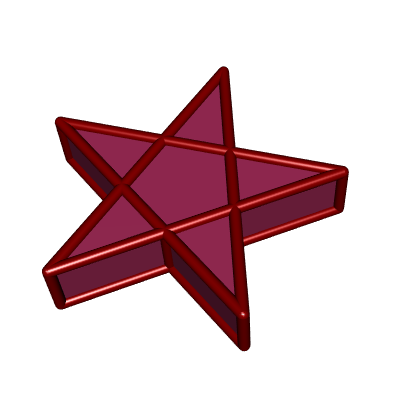
One can also plot only the exterior edges, that is to say the edges which are
not between two coplanar faces:
```r
shade3d(tmesh, color = "maroon")
plotEdges(
mesh[["vertices"]], mesh[["exteriorEdges"]], color = "darkred",
tubesRadius = 0.02, spheresRadius = 0.02
)
```
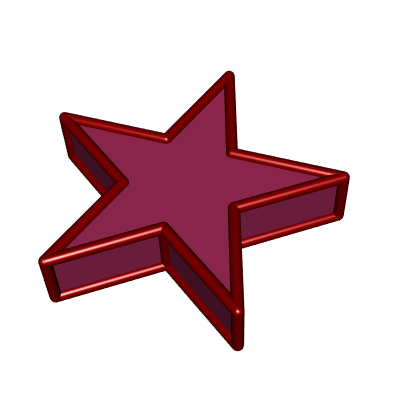
## License
This package is provided under the GPL-3 license but it uses the C++ library
CGAL. If you wish to use CGAL for commercial purposes, you must obtain a license
from the [GeometryFactory](https://geometryfactory.com).